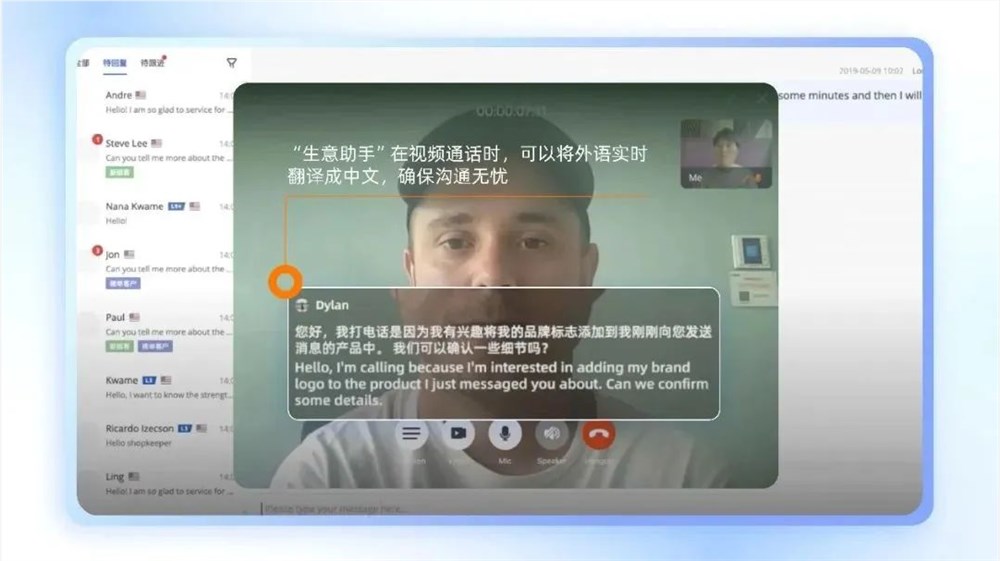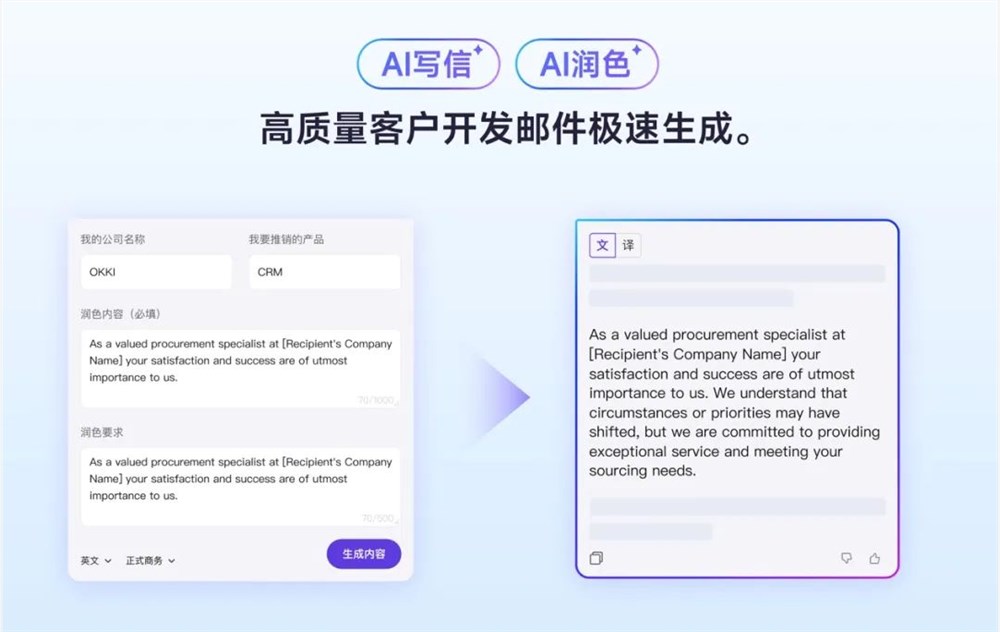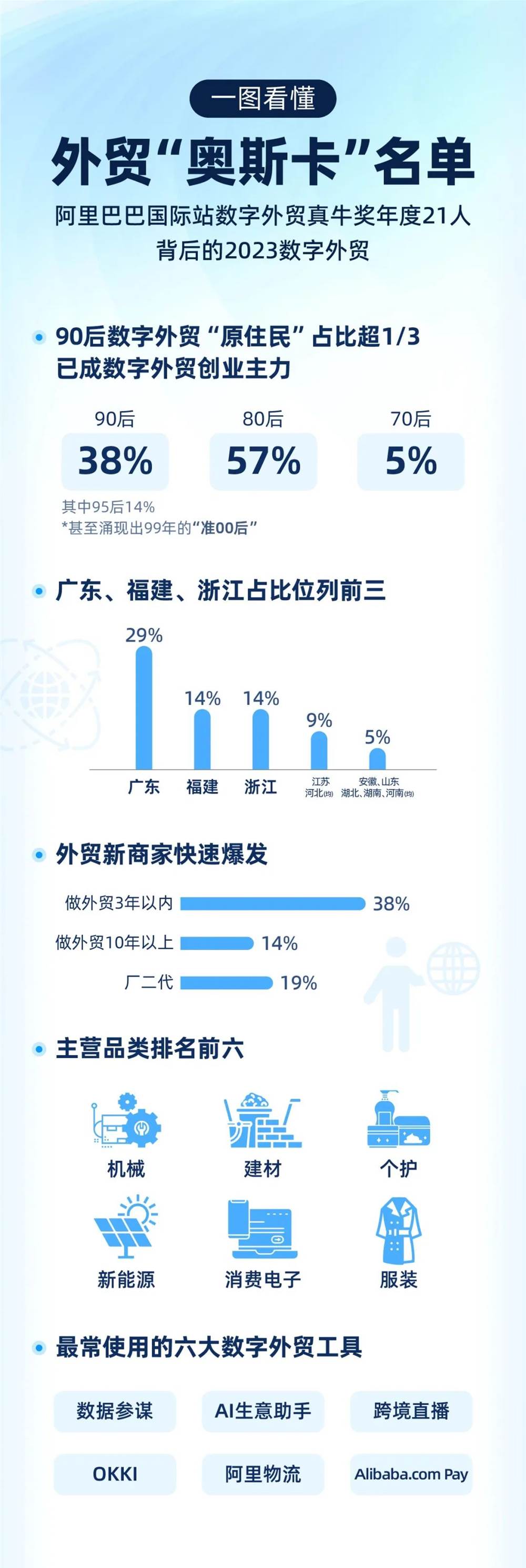Alibaba Achieves Significant Improvement in Foreign Trade with AI
-
2024, Alibaba International focuses on AI and buyer experience
"User First, AI Driven", Alibaba's two major strategic priorities are continuously advancing.
Recently, Qin Fen, head of Alibaba International's industry and merchant business department, stated that the strategic focus for 2024 will be on AI e-commerce and creating certainty around buyers.
In 2024, Alibaba International's AI development will balance empowering sellers with enhancing user experience. Qin Fen also emphasized, "The next step for AI will focus on improving buyer user experience." AI will become a true purchasing assistant for buyers, using large models to better match suppliers, products, and buyers, significantly reducing buyers' selection costs. "This will be a very core strategy for 2024-2025."
Not long ago, Jack Ma made a rare response on Alibaba's internal forum to employees' discussions about Pinduoduo's financial report data and operational suggestions for Alibaba: "I firmly believe Alibaba will change and improve," stating that the AI e-commerce era has just begun, presenting both opportunities and challenges for everyone.
Focusing on AI-driven e-commerce is a common consensus across the entire Alibaba Group. Wu Yongming, the CEO of Alibaba Group, who made "AI-driven" his strategic focus upon taking office, also concurrently serves as the CEO of Taotian Group and the Chairman & CEO of Alibaba Cloud. Under unified leadership, Alibaba is striding confidently into the AI e-commerce era.
Among these, Alibaba International has been the earliest to implement AI applications. In 2023, the platform developed AI functionalities for sellers in three key business scenarios: responses, inquiries, and data analysis. Examples include the first AI foreign trade application "Business Assistant" and the OKKI AI tool.
At the same time, user experience is also a key focus for Alibaba International in 2024. Qin Fen stated that the platform needs to adopt a user-centric approach to enhance transaction experiences with more certainty, such as country-specific operations and reliable logistics routes.
Specifically, in 2023, Alibaba International Station focused on refined operations, particularly in the construction of e-commerce infrastructure, including cross-border logistics, finance, and technological efficiency improvements.
In the second half of 2023, Alibaba International Station successively launched the North America Pavilion, Europe Pavilion, and Southeast Asia Pavilion, precisely matching the local demands of key national markets with the product categories of platform merchants, while also providing cross-border logistics support for foreign trade enterprises.
Through this localized and refined operation strategy, Alibaba International Station achieved very rapid business growth in Latin America in 2023, with Mexico and Southeast Asia also showing fast initial growth, while the US and Europe maintained steady and rising performance.
Latest data shows that Alibaba International Station's active users in North America, Europe, and Southeast Asia markets increased by approximately 35% year-over-year in 2023, with the number of paying buyers also growing by around 35%.
In logistics, Qin Fen revealed that during the March 2024 New Trade Festival, Alibaba Logistics will roll out buyer-side upgrades to enhance shipping time and price certainty for buyers.
The improvements will focus on three key areas:
- Price certainty: Accurate display of product prices + shipping fees
- Delivery time guarantee: Offering buyers three-tier differentiated shipping services (Premium, Standard, Economy) with clear arrival times
- Hassle-free service: 24/7 global response without time zone barriers
On the front-end page, products with guaranteed logistics timeliness by Alibaba appear in the homepage navigation bar, and there are even prompts for bundling scenarios to guide users to place more orders. According to statistics, one-third of the orders on Alibaba International Station in 2023 were handled by Alibaba Logistics.
Alibaba International Station's AI Product Layout Across the Entire Supply Chain
Alibaba International Station has officially launched its two full-link AI products, namely the 'Business Assistant' and 'OKKI AI' services.
Among them, Alibaba International Station AI 'Business Assistant' is the first AI product to truly penetrate the industry and form a business model, officially launched on November 1, 2023, primarily targeting international station sellers.
The 'Business Assistant' helps sellers with intelligent product listings by extracting core selling points and keywords, and generating text, images, or short videos. For example, when a merchant lists a product like 'aromatic candles,' they simply input the Chinese product name in the backend and click 'Title Optimization.' The 'Business Assistant' then automatically generates three more compelling English product titles by combining Alibaba International Station's product features and trending search terms.
Additionally, the 'Business Assistant' supports intelligent product insights. It aggregates and analyzes information to diagnose sellers' products and identify external new product trends, ultimately providing conclusions and recommendations to sellers.
The 'Business Assistant' can also provide intelligent reception services. It not only overcomes language barriers in communication between buyers and sellers but also extracts customer needs, recommends appropriate responses, and offers timely and effective replies even late at night. This can help mitigate issues like low efficiency caused by time differences.
Now, foreign trade salespeople on Alibaba International don't need to worry too much about language proficiency, as AI can provide real-time translation subtitles even during video calls.

Image source: Alibaba International Station Official Account
In the foreign trade market, traditional language translation services can cost around 1,500 RMB for an 8-hour accompanying translation session. For overseas market insights, businesses not only need to visit markets individually but also face costs of approximately 30,000 RMB per person per country per visit. In contrast, using AI can save sellers a significant amount of expenses.
Internal test data shows that the AI 'Business Assistant' can help foreign trade merchants increase exposure by about 19%. One participating merchant revealed, "The tool's ability to refine selling points demonstrates professional expertise in foreign trade." Previously, they could produce 20 videos a day, but now the capacity has increased tenfold to 200 videos.
Another founder of a foreign trade company also stated, 'Within a month, the AI Business Assistant helped salvage at least 28 'lost' orders.'
Another service, OKKI AI, is designed for professionals across all industries and officially launched on December 1, 2023. OKKI is an enterprise SaaS tool, serving as an "intelligent workbench for foreign trade business" for international sellers. As early as the end of May 2023, OKKI began its intelligent upgrade with the goal of enabling small and medium-sized foreign trade enterprises to adopt AI first.
Unlike the "Business Assistant," OKKI AI also features intelligent customer management functions, including one-click generation of customer "contact lists," real-time tracking to predict customer conversion probabilities, and tailored management strategies for both new and existing clients.
Internal test data shows that promotional emails polished by OKKI AI achieve a 32.12% higher response rate from overseas clients.

Image source: Alibaba International Station official account
At the management level, OKKI AI provides operational and data analysis, enabling managers to clearly identify business gaps and comprehensively understand sales representatives' client communication. This assists in decision-making, improves the decision quality of foreign trade teams, and drives business growth.
This comprehensive suite of AI-powered full-chain products covers the entire upstream and downstream of the foreign trade industry, improving work and marketing efficiency for sellers from all aspects, lowering industry barriers and labor costs. It also enables sellers to focus more on creative fields, thereby enhancing overall service levels. In November, products optimized by AI on Alibaba International Station saw a 15% increase in overseas inquiries compared to before.
Alibaba International President Zhang Kuo stated that in 2023, Alibaba International launched the first full-chain AI product for the foreign trade industry. Improvements in cross-border live streaming, logistics experience, and financial services were made to make foreign trade as simple as possible for every merchant.
AI Industrialization Applications Enter a Long-Distance Race
Currently, the era of digital foreign trade has arrived. Empowered by AI, digital new foreign trade represented by cross-border e-commerce has further accelerated the global expansion of small and medium-sized enterprise sellers and professional sellers.
Data from the Ministry of Commerce shows that there are now over 100,000 cross-border e-commerce entities in China, and the scale of cross-border e-commerce in China has grown nearly tenfold in the past five years.
Chinese products are in high demand overseas due to their cost-effectiveness. Customs data shows that in the first three quarters of 2023, China's cross-border e-commerce imports and exports reached 1.7 trillion yuan, with exports accounting for 1.3 trillion yuan, a growth of 17.7%.
On November 16, the Alibaba International Station Digital Foreign Trade True Bull Award was held in Hangzhou, where 21 foreign trade practitioners competed for the top 10 spots by sharing their practical experiences in digital foreign trade. Notably, over 38% of the participants were born in the 1990s or even the 'quasi-2000s', a significant increase compared to previous years, with those born after 1995 accounting for 14%. Digital foreign trade has become an important choice for young entrepreneurs.
Meanwhile, in terms of the duration of engaging in foreign trade, new merchants who have joined Alibaba International Station within the past 3 years account for 38% of all participants. Alibaba's AI foreign trade products have already been widely used among these foreign trade practitioners.

Image source: Alibaba International Station official website
Alibaba International Station has transitioned from its initial role as a yellow pages display platform to encompassing the entire business process, including customer acquisition, order conversion, delivery fulfillment, compliance management, and enterprise administration. Now, with the integration of AI applications, digital reconstruction is steadily progressing.
As AI technology matures, the integration between technology and industry is deepening. Zhang Kuo, President of Alibaba International Station, believes that 'AI has entered a long-term phase of integration with industries.'
According to exclusive news from LatePost, Alibaba's two core e-commerce businesses—Taotian Group and International Digital Commerce Group—have both established complete teams focused on AI.
The International Digital Commerce Group, led by cross-border business industry leader Zhang Kaifu, has formed an AI Business team that currently has over 100 members. About one-third of the team is dedicated to model training, while the rest focus on model inference applications, infrastructure, and the development and operation of specific products.
In November, AI Business officially launched its AI product 'Aidge', which features translation, marketing, localization content, design, and a range of other functions. It supports various businesses under Alibaba International and also provides API access to independent software vendors (ISVs) and SaaS providers.
Technology development and industrial application will be a lengthy process. Currently, the full-chain foreign trade AI products have not yet reached a very high standard and still require long-term refinement and iteration. Alibaba International aims to help each seller develop their own small models, pushing foreign trade AI models into a new phase.
In the broader context, the enthusiasm for AI in e-commerce has reached unprecedented levels both domestically and internationally. In China, tech giants like Alibaba, JD.com, and Pinduoduo have successively entered the AI arena, rolling out everything from large language models to AI applications. Meanwhile, international players such as Amazon, Google, and eBay are also rushing to introduce new AI features and applications.
However, recent reports indicate that Amazon's AI-powered review summary feature hasn't lived up to its 'intelligent' expectations. Some Amazon sellers have noted that despite multiple updates, the feature's summaries of customer reviews still suffer from inaccurate product descriptions and an excessive focus on negative feedback.
In response, an Amazon spokesperson stated: "We are deeply committed to the accuracy of summaries and will continue to refine this technology based on feedback from consumers and sellers."
For the foreseeable future, AI will dominate the era. For Alibaba at present, nurturing and advancing technology will be a crucial factor in breaking through future challenges. How to effectively leverage AI's potential remains a key issue Alibaba must address.
